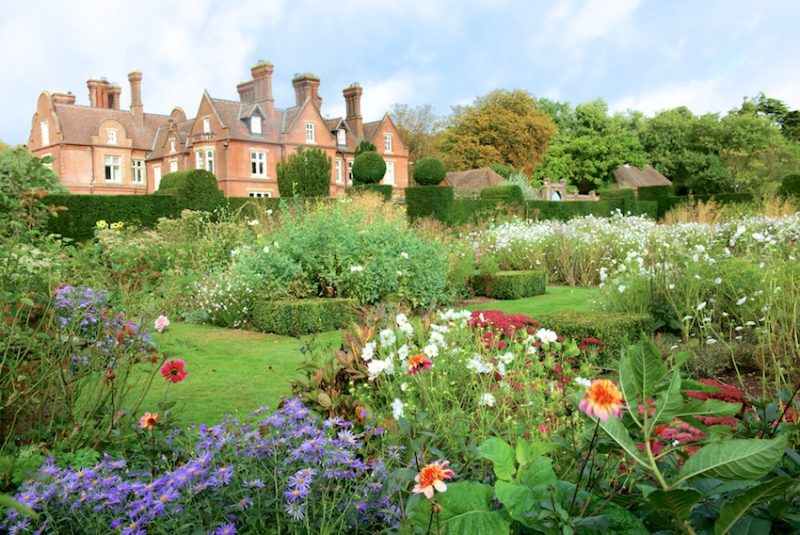
The sunk garden borders at Doddington Place, full of flowers for a floristry workshop for the Chelsea Fringe
One morning in 2010, during Chelsea Flower Show week, garden writer and historian Tim Richardson, who was at the time lying in bed, was struck by an idea. This was the simple but brilliant thought that, in addition to the world’s oldest and best flower show, there was room for something fresher, less reliant on rules, regulations, judging criteria and committees and the weighty burden of its reputation and history. Two years later, the first Chelsea Fringe exploded onto the scene – at the same time as the Chelsea Flower Show and with the support of the Royal Horticultural Society, but entirely independent.
In essence, the idea was to celebrate the growing movement for community and guerrilla gardening, and also to encourage links between gardens and art, literature, music, cookery, history, crafts and ecology. The beauty of the Chelsea Fringe, Tim has explained, is that it is a true fringe festival – based on the Edinburgh model – in that nothing is commissioned or curated. ‘If it’s on topic, legal and interesting, it can go in the Fringe, no matter how outlandish or odd it may seem.’ Essentially, the Fringe’s mission is to engage people’s imaginations rather than to ‘put on a show’. The Chelsea Fringe is refreshingly unsponsored, unfunded, unbranded, run entirely by volunteers, and as a Community Interest Company (CIC), its overheads are modest and met from registration fees (£30 each for community gardens).

The Chelsea Fringe logo
An immediate success in the UK, the Chelsea Fringe soon sparked off satellite events as far afield as Japan, Italy, Poland and Australia. Kent embraced the concept early on, and this year has a brilliant programme, with events in Cranbrook, Leeds Castle, Blooming Green near Maidstone and a particularly sparky line-up at Doddington Place Gardens, on Faversham’s doorstep.
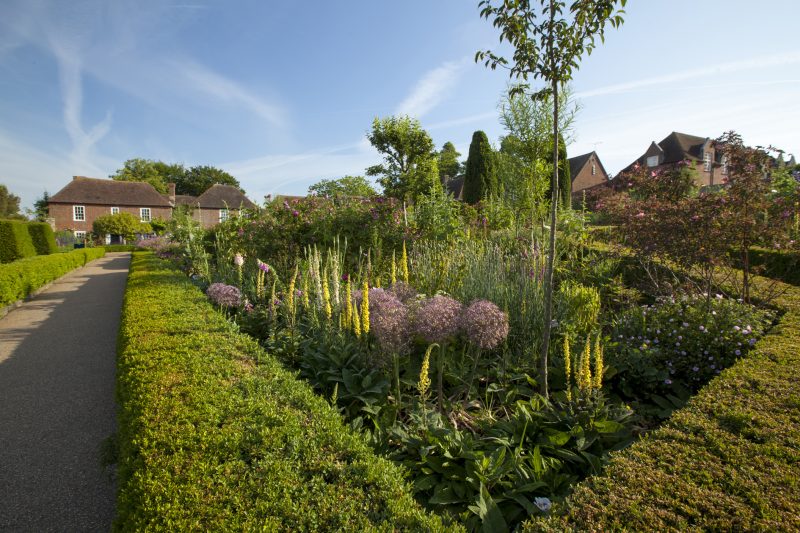
The Culpeper Garden at Leeds Castle features in the Chelsea Fringe event Inside Out
Chelsea Fringe is on at Leeds Castle daily from 20 May – 4 June. On the theme of Inside Out, the gardeners are reinventing the garden shed, recreating Leeds Castle Gardens in mini versions on the inside. On the outside, there will be gardening tools and information about notable plants and where to find the full-size versions around the grounds. Full details from www.leeds-castle.com.
At the Blooming Green flower plot at Loddington Farm, Linton, near Maidstone, from 25 – 27 May, a series of informal practical workshops, starting with a Planting and No-Dig workshop inspired by no-dig guru Charles Dowding, will be followed by floristry workshops on buttonholes and hand-tied bouquets and an afternoon of pick-your-own flowers. For more details and to book visit www.bloominggreenflowers.co.uk.
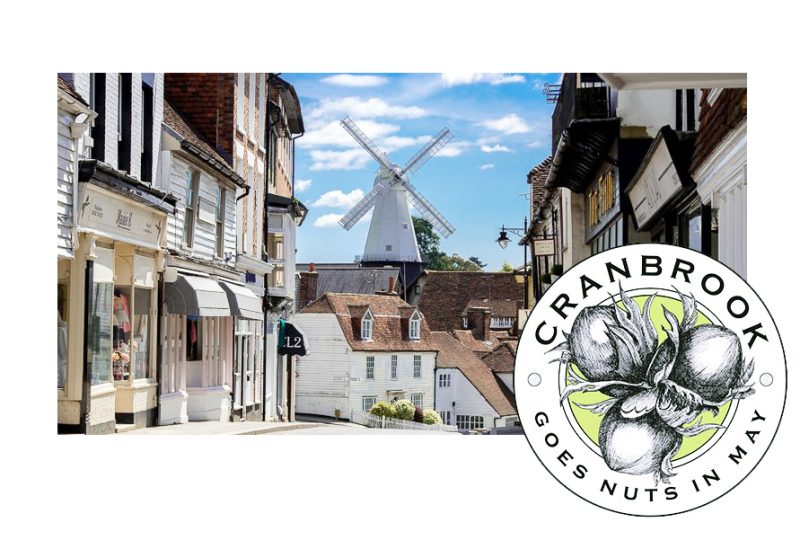
Cranbrook High Street
On 28 and 29 May, under the title Cranbrook Goes Nuts in May, this gorgeous Kent market town will close its high street to traffic and lay on a feast of garden-related events, ranging from willow weaving to spray can art, chainsaw sculptures and vegetable carving. The event is free and there will be street stalls and music.
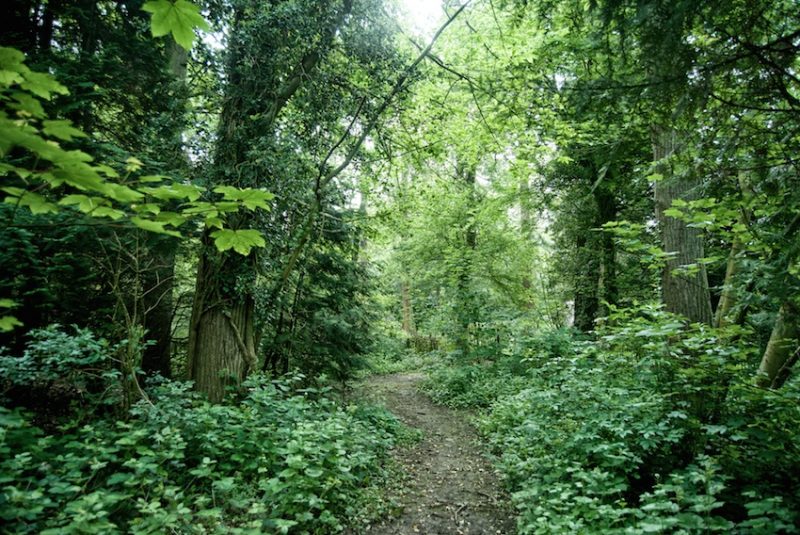
The woodland garden at Doddington, the setting for bushcraft and encounters with creepy crawlies
Doddington Place has one of Kent’s most beautiful gardens. It is set in glorious countryside in an area of outstanding natural beauty. The ten-acre garden has both grandeur and intimacy, and is imbued with a palpable tranquillity. Its many features include massive yew hedges, a restored Edwardian rock garden, and a formal sunk garden with borders that appear effortlessly to supply interest and inspiration from May to October thanks to the plantsmanship of the owners, Amicia and Richard Oldfield, and their Head Gardener, Lucy Adams.
Chelsea Fringe at Doddington kicks off on 23 May with two sessions, from 10am -1pm and again from 2pm – 5pm (repeated on 25 May) of a Herbal Walk, Talk and Natural Remedy-Making Class, led by Milena Moore of Apotheca in West Street in Faversham. Milena and her fellow herbalist Claire Rother will lead participants through the gardens, identifying and gathering plants and discussing their medicinal use, both in folklore and informed by modern research. In the Coach House the group will then make up a range of herbal preparations, including cold infusions and infused oils. When I spoke to her, Claire mentioned cleavers, all too familiar to gardeners as a tenacious weed, as a herb that is likely to feature. ‘It is good for the lymphatic system, helping to detox the body and boost immunity. It is also good for skin conditions such as eczema.’ Workshop numbers are limited to 20 and it is essential to book. The fee of £25 includes entrance to the gardens for the whole day – the gardens are open for the group event only – and tea, coffee and cake. To book call 01795 227423 or email info@apothecaclinic.co.uk.
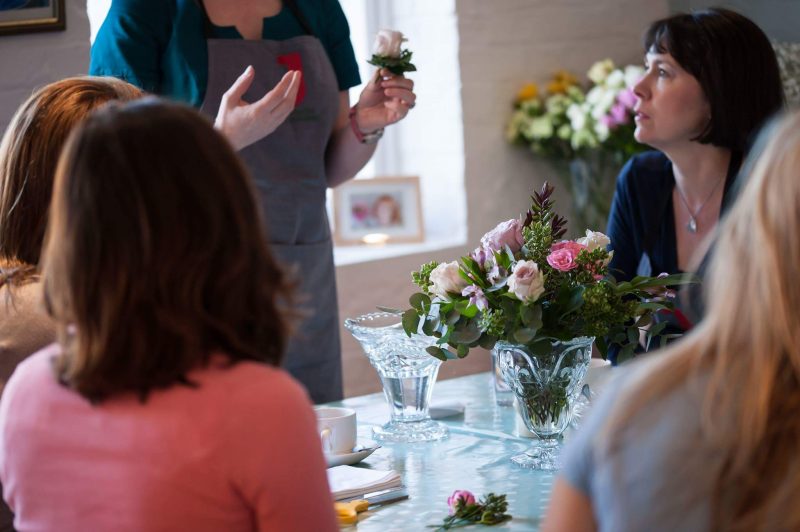
Julie Davies with a rapt audience
On 24 May from 10am – 4pm Julie Davies will be letting participants in her Floristry Workshop loose in Doddington’s glorious herbaceous borders to fill their buckets with delectable flowers; Head Gardener Lucy Adams will provide guidance on what to pick. Base camp will be the Coach House where, after a light lunch, Julie will demonstrate how to arrange flowers at home. Aprons, scissors and buckets will be provided; participants should bring their own vases or jugs to take their compositions home. The course costs £75 and should be booked directly with Julie. Email her on julie@juliedaviesflowerworkshops.co.uk.
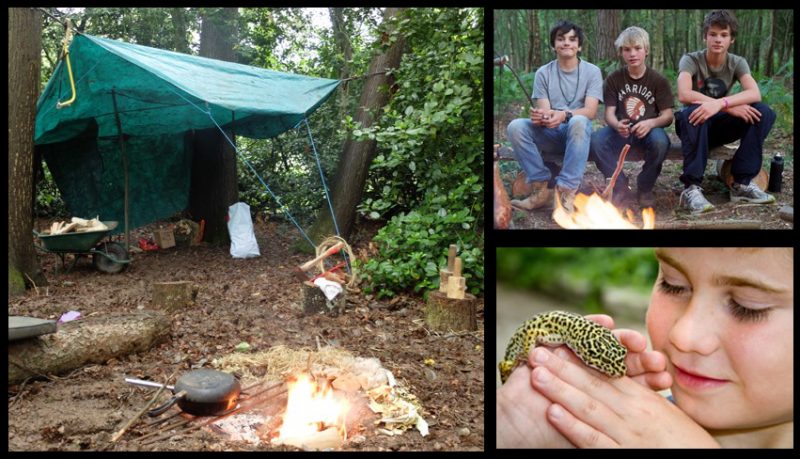
Bushcraft in the woodland garden and creepy crawlies
Jazz in the Gardens will feature on 28 and 29 May, and then, perfectly timed for half-term on 31 May will be Bushcraft and Creepy Crawlies, running all day and included in the entrance fee of £2 for children and £7 for adults. Gardener David Breakall and his gamekeeper father, Rob, will be making a fire in the woodland garden, and cooking delicious food such as nettle soup and game stew with wood pigeon, pheasant and vegetables. Visitors can track them down in the woods and have a go at skinning a rabbit, making a wooden mallet, foraging for food and for the Tinder fungus, also known as King Alfred’s cakes, which are great for firelighting. To round off the fun, there will be creepy crawlies to encounter, such as millipedes, a snake, a bearded dragon and spiders. Plenty of excitement, for children of all ages.
www.doddingtonplacegardens.co.uk
Text: Sarah. Photography: Lisa Valder and others
SaveSave